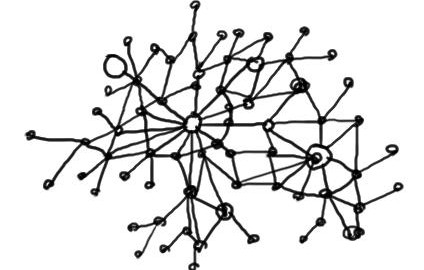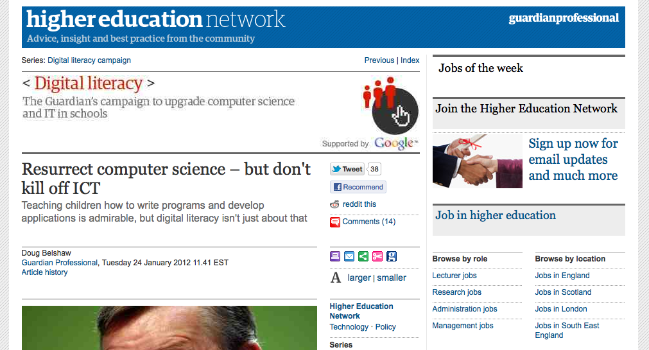On ‘rigour’ in definitions of digital and web literacy.
Update: For the latest information on the Web Literacy standard work, head to http://mzl.la/weblitstd
TL;DR version: If we define rigour as something that’s ‘unchanging’ and ‘objective’ then it’s almost impossible to be ‘rigorous’ about digital and web literacy. Instead, I propose that instead of being rigorous that we’re relevant, even if that’s at the expense of some objectivity.
Here’s an interesting one. I occasionally get corralled into Twitter conversations as someone who knows about something or other. Today, it was Miles Berry after being asked why the new draft National Curriculum should include ‘digital literacy’. The assumption by his interlocutor (Bruce Nightingale) was that in order for a subject to be included in a programme of study it should be ‘rigorously defined’ with a ‘body of knowledge’ behind it.
When I asked whether rigour means ‘has a definition everyone agrees on’ Bruce pointed me towards this blog post by Jenny Mackness on ‘academic rigour’. The conversation quickly became too nuanced to do justice in 140-character bursts, hence this follow-up blog post. I hope Bruce has time to reply.
In Jenny’s post she talks about finding definitions of ‘academic rigour’ unsatisfactory. I’d suggest that’s because it’s a kind of Zeugma, an ambiguous term. But let’s just focus upon ‘rigour’. The Oxford English Dictionary (probably the best place to resort when faced with knotty problems of definition) gives the etymology of ‘rigour’ as:
Etymology: < Anglo-Norman and Middle French rigour, Middle French rigeur, rigueur (French rigueur ) inflexible severity, severity, harshness (12th cent. in Old French), strict application (of laws) (13th cent.), feeling of tingling or prickling (a1365 in medical context), (in plural) repressive measures (15th cent.), cruelty (15th cent.), harshness that is difficult to bear (end of the 15th cent., of cold, etc.), exactitude, precision (1580) and its etymon classical Latin rigor unbending quality, stiffness, rigidity, numbness, numbness of the body in fever, unyielding hardness, frozen condition, quality of being stiffly erect, tautness, inflexibility, sternness, severity, uncouthness < rig?re to be stiff (see rigent adj.) + -or -or suffix. Compare Old Occitan rigor (1461), Catalan rigor (14th cent.), Spanish rigor (13th cent.), Portuguese rigor (14th cent.), Italian rigore (a1320).
I can’t help but think when I see words like ‘harshness’, ‘cruelty’, ‘exactitude’, ‘precision’, ‘rigidity’ and ‘inflexibility’ that we’re using the wrong word here. Applying such stringent measures to an ambiguous term like ‘digital literacy’ is problematic as ‘digital’ pertains to many different referents. To talk of rigour (as defined above), then, is verging on the ridiculous.
But does a lack of rigour around a subject, topic or idea make it less valuable? I’d suggest not. Instead, I’d suggest it’s the terminology we’re using that’s problematic. Let’s take another example: the idea of academic ‘impact’. What, exactly, does that mean? You may well be able to draw up a framework or points for this or that, rewarding academics for performing certain activities and publishing in various places. But what about obvious areas of ‘impact’ that lie outside of that rigid framework? Rigour does not mean relevancy. Sometimes the problem is with the tools you are using rather than the thing you are trying to describe. It’s OK for things to be nebulous and slightly intangible.
Having spent several years of my adult life delving into the murky world of new literacies I’d suggest that (for example) helping young people learn how to use digital devices, how to think computationally, and how to stay safe online are extremely relevant things to be doing. Can we boil these activities down to things to be learned once for all time? Of course not. It’s hard enough when you’ve got a single referent (e.g. the Web)
So, in conclusion, I’ll see your definition of ‘rigour’ and raise you a ‘relevance’. Not everything that is valuable can be measured objectively. Nor should it be.
Image CC BY-NC-SA Josh Clark



